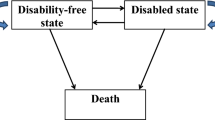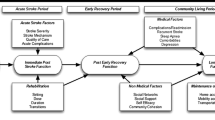Abstract
This study aims to assess relationships between previous stroke diagnosis and demographic or disability status variables, stratified by U.S. citizenship status. The 2019 and 2021 National Health Interview Survey data were analyzed for both descriptive statistics and logistic regression models. Age, sex, income level, race/ethnicity, health insurance status, and indicators of disability common after stroke were predictor variables of interest. For each disability predictor variable, higher odds of having stroke were seen regardless of citizenship status, except for the ‘difficulty remembering’ variable. For U.S. citizens, increasing age corresponded with higher odds of stroke diagnosis. For noncitizens, odds ratios decreased from 40.3 (95% CI 38.88–41.82) for the 40–65 age group to 29.6 (95% CI 28.38–30.77) in the 80 + group, when compared with the 18–39 age reference group. Female noncitizens had higher odds of stroke, while male citizens had higher odds. Non-Hispanic Black citizens had higher odds of stroke, while the other racial/ethnic groups had higher odds for noncitizens. The results indicated the existence of several socio-demographic disparities in stroke. Notably, noncitizens experienced stroke at a younger age and reported more severe disability outcomes after stroke diagnosis than citizens.
Similar content being viewed by others
References
Tsao CW, Aday AW, Almarzooq ZI, et al. Heart Disease and Stroke statistics—2022 update: a report from the American Heart Association. Circulation. 2022;145(8). https://doi.org/10.1161/CIR.0000000000001052.
Towfighi A, Saver JL. Stroke declines from third to fourth leading cause of death in the United States. Stroke. 2011;42(8):2351–5. https://doi.org/10.1161/STROKEAHA.111.621904.
Lv Y, Sun Q, Li J, Zhang W, He Y, Zhou Y. Disability status and its influencing factors among Stroke patients in Northeast China: a 3-Year follow-up study. Neuropsychiatr Dis Treat. 2021;17:2567–73. https://doi.org/10.2147/NDT.S320785.
Khan SU, Khan MZ, Khan MU et al. Clinical and Economic Burden of Stroke Among Young, Midlife, and Older Adults in the United States, 2002–2017. Mayo Clinic Proceedings: Innovations, Quality & Outcomes. 2021;5(2):431–441. https://doi.org/10.1016/j.mayocpiqo.2021.01.015.
Strilciuc S, Grad DA, Radu C, et al. The economic burden of Stroke: a systematic review of cost of Illness studies. J Med Life. 2021;14(5):606–19. https://doi.org/10.25122/jml-2021-0361.
Rochmah TN, Rahmawati IT, Dahlui M, Budiarto W, Bilqis N. Economic burden of Stroke Disease: a systematic review. Int J Environ Res Public Health. 2021;18(14). https://doi.org/10.3390/ijerph18147552.
Cunningham SA, Ruben JD, Venkat Narayan KM. Health of foreign-born people in the United States: a review. Health Place. 2008;14(4):623–35. https://doi.org/10.1016/j.healthplace.2007.12.002.
Vyas MV, Laupacis A, Austin PC, Fang J, Silver FL, Kapral MK. Association between immigration status and acute Stroke care: a retrospective study. Stroke. 2020;51(5):1555–62. https://doi.org/10.1161/STROKEAHA.119.027791.
Stansbury JP, Jia H, Williams LS, Vogel WB, Duncan PW. Ethnic disparities in Stroke. Stroke. 2005;36(2):374–86. https://doi.org/10.1161/01.STR.0000153065.39325.fd.
Burns SP, White BM, Magwood G, et al. Racial and ethnic disparities in Stroke outcomes: a scoping review of post-stroke disability assessment tools. Disabil Rehabil. 2019;41(15):1835–45. https://doi.org/10.1080/09638288.2018.1448467.
Centers for Disease Control and Prevention. NHIS – 2019 questionnaire redesign. Published March 3, 2022. Accessed March 3., 2023. https://www.cdc.gov/nchs/nhis/2019_quest_redesign.htm.
U.S. Department of Education. Federal TRIO programs current-year low-income levels. Published March 21., 2022. Accessed June 19, 2022. https://www2.ed.gov/about/offices/list/ope/trio/incomelevels.html.
Ezekiel L, Collett J, Mayo NE, Pang L, Field L, Dawes H. Factors associated with participation in life situations for adults with Stroke: a systematic review. Arch Phys Med Rehabil. 2019;100(5):945–55. https://www.sciencedirect.com/science/article/pii/S000399931830443X.
von Elm E, Altman DG, Egger M, Pocock SJ, Gotzsche PC, Vandenbroucke JP. The Strengthening the Reporting of Observational Studies in Epidemiology (STROBE) Statement: guidelines for reporting observational studies.
Kelly-Hayes M. Influence of age and health behaviors on Stroke risk: lessons from longitudinal studies. J Am Geriatr Soc. 2010;58(Suppl 2):325–S328. https://doi.org/10.1111/j.1532-5415.2010.02915.x.
Rexrode KM, Madsen TE, Yu AYX, Carcel C, Lichtman JH, Miller EC. The impact of sex and gender on Stroke. Circul Res. 2022;130(4):512–28. https://doi.org/10.1161/CIRCRESAHA.121.319915.
Maldonado CZ, Rodriguez RM, Torres JR, Flores YS, Lovato LM. Fear of discovery among latino immigrants presenting to the Emergency Department. Acad Emerg Med. 2013;20(2):155–61. https://doi.org/10.1111/acem.12079.
Tetzlaff J, Geyer S, Tetzlaff F, Epping J. Income inequalities in Stroke incidence and mortality: Trends in stroke-free and stroke-affected life years based on German health insurance data. PLoS ONE. 2020;15(1):e0227541. https://doi.org/10.1371/journal.pone.0227541.
Keisler-Starkey K, Bunch LN. Health Insurance Coverage in the United States: 2021. U.S. Census Bureau; 2022. Accessed January 24, 2023. https://www.census.gov/library/publications/2022/demo/p60-278.html.
Vernice NA, Pereira NM, Wang A, Demetres M, Adams LV. The adverse health effects of punitive immigrant policies in the United States: a systematic review. PLoS ONE. 2020;15(12):e0244054. https://doi.org/10.1371/journal.pone.0244054.
Corbie-Smith G, Thomas SB. St. George DMM. Distrust, race, and Research. Arch Intern Med. 2002;162(21):2458–63. https://doi.org/10.1001/archinte.162.21.2458.
Funding
The authors received no financial support for the research, authorship, and/or publication of this article.
Author information
Authors and Affiliations
Contributions
Heather Dixon performed the statistical analysis, interpreted the results, wrote, and edited the manuscript. Daudet Tshiswaka was involved in the study design, reviewed the statistical analysis and its interpretation, and edited the manuscript. All authors read and approved the manuscript.
Corresponding author
Ethics declarations
Competing interests
The authors declared no potential competing interests with respect to the research, authorship, and/or publication of this article.
Ethics Approval
This study was exempt from approval by the University of West Florida’s Institutional Review Board for Human Research Participant Protection Policy C.4.a regarding secondary research of publicly available data.
Additional information
Publisher’s Note
Springer Nature remains neutral with regard to jurisdictional claims in published maps and institutional affiliations.
Rights and permissions
Springer Nature or its licensor (e.g. a society or other partner) holds exclusive rights to this article under a publishing agreement with the author(s) or other rightsholder(s); author self-archiving of the accepted manuscript version of this article is solely governed by the terms of such publishing agreement and applicable law.
About this article
Cite this article
Dixon, H.M., Ilunga Tshiswaka, D. Socio-Demographic and Disability Disparities in Stroke by Citizenship Status: A Cross-Sectional Analysis. J Immigrant Minority Health 26, 427–433 (2024). https://doi.org/10.1007/s10903-023-01572-4
Accepted:
Published:
Issue Date:
DOI: https://doi.org/10.1007/s10903-023-01572-4




